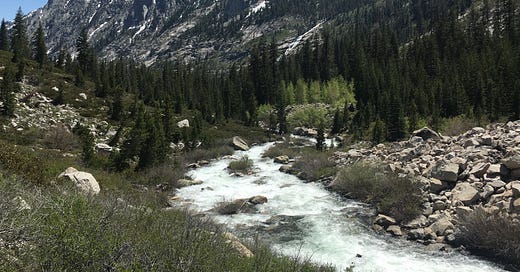Bonus Issue: The Legs Feed The Wolf

Two newsletters in three days? What’s that all about?
Today is the three-year anniversary of my completion of a Pacific Crest Trail thru-hike: 2,650 winding and arduous miles from Mexico to Canada up the west side of America. It’s an occasion that feels worth mentioning, not least because this newsletter wouldn’t exist without the writing experience I gained as I walked for 146 days through sun and rain and snow.
There is a framed print in my living room that my brother made for me after I finished. It’s a picture of a lush, snow-fed river in the Sierras cutting through a meadow at the foot of a mountain pass whose name escapes me now. Splashed across it in gonzo script is a simple phrase: THE LEGS FEED THE WOLF.
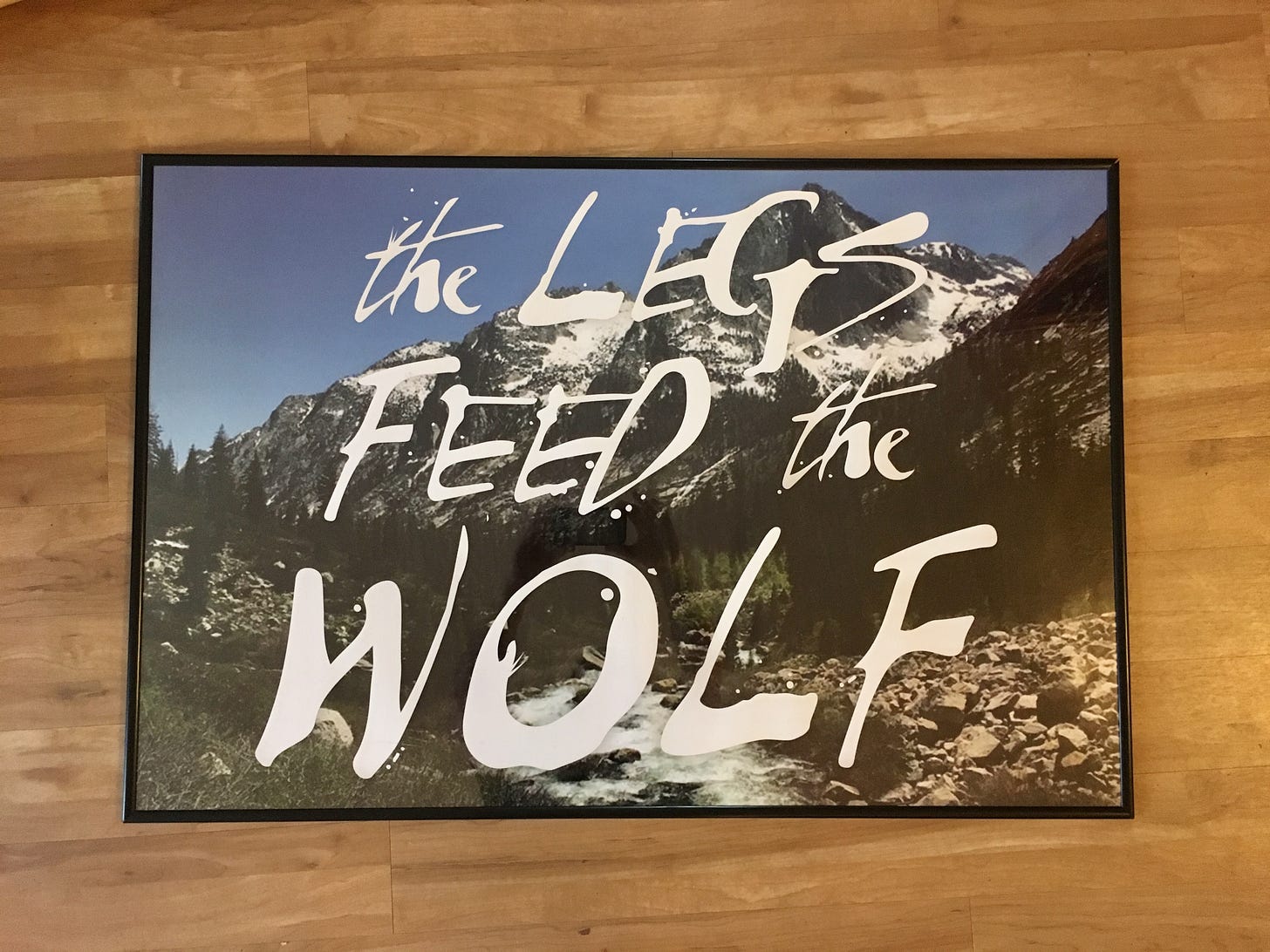
I ripped the line off from the movie Miracle, which my roommates and I watched ad nauseam in college. You can see why it felt worth stealing, maybe:
It was my mantra out there. Between April 14th and September 6th I walked all that way and lost about 40 pounds in the offing—maybe the wolf wasn’t getting fed enough regardless of what its legs were up to. But I needed something to lean on as I upped my pace from a standstill to regular days of 29 or 30 or 31 miles.
My months on the trail were eye-opening in more ways than one and I look back on them now with a sort of absent sweetness, and a wonder that that life could have ever been mine. The spring and summer of 2016 were the last time I ever got away with believing that I could in good conscience remove myself from the concerns of the real world for any length of time. During that time the extent of my political engagement was consumptive; I allowed myself to believe that posting angrily about injustice and listening to the right podcasts was doing politics.
Actually, even that level of political involvement was considered gauche on trail. My sourest memories of my thru-hike—other than the fear-mongering, which I’ll get to in a moment—stem from the people I met who believed thru-hiking to be a libertine, libertarian adventure. That they owed nothing to anyone and to consider others, especially others external to the thru-hiking experience, was beneath them. These people are blessedly few in person on the trail but if you ever have the misfortune to find yourself in the comments of posts on thru-hiking Facebook pages and blogs, you will find that they are legion.
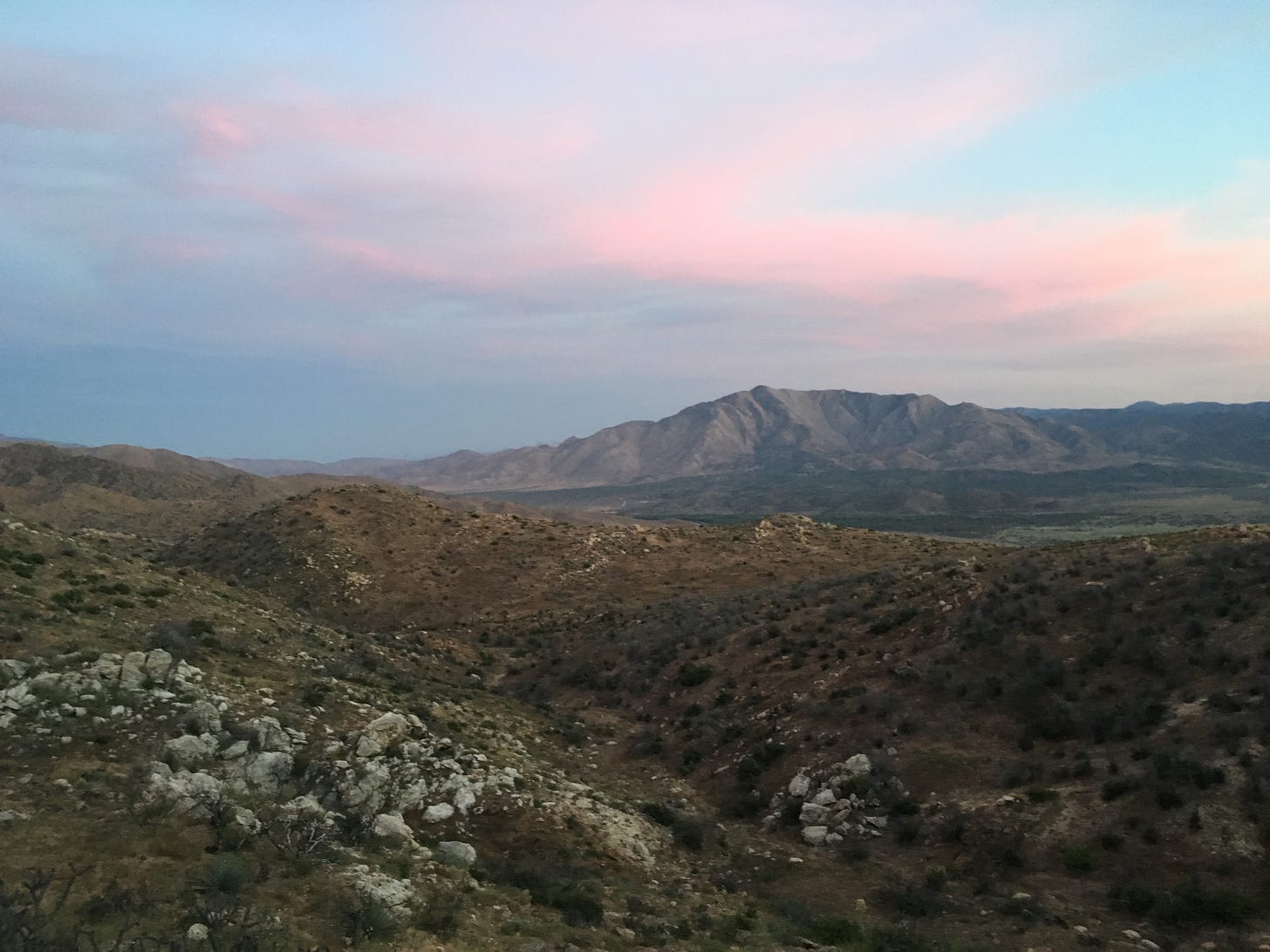
Now, the invention of fear: it is a fact of life that some people’s coping mechanism for fear is to try to make others feel it, too. This is also rampant on trail. Two examples I wrote about at the time:
“Anyone who goes into the Sierras before June 15 is an idiot with a death wish,” said one hiker, a pot-bellied man in his fifties. “I hope none of you are thinking of doing it.” I looked guiltily away and said nothing. I was planning on going in as soon as I got there, and the historical and literary appeal of such a place was no small part of the draw. These were the mountains where the Donner Party foundered and ate their own to survive, where Kit Carson cemented his legacy as a true American frontiersman, where Jim Bridger carved out a name for himself years after leaving Leonardo DiCaprio to die in the wilderness and getting the piss slapped out of him by Tom Hardy. I wanted my piece of that legacy.
The old man came through the swinging door of the general store. Worn blue flannel shirt, knife clipped to jeans pocket, big hands that had spent a lifetime working hard. He walked with the air of someone used to being listened to.
“Forester’s impassable,” he said brusquely to the woman behind the counter. “Any hiker with a lick of sense is getting out at Cottonwood Pass and skipping ahead. Bad snow and ice up there.”
He paid for a soda and looked at me sidelong as the cashier rang him up. It felt like he was trying to figure out if I was one of those hikers with a lick of sense, for it was clearly apparent that I was a hiker. My own uniform—puffy jacket torn in a few places, wicking shirt, and a month’s worth of untidy beard—made that much obvious.
As the store’s door chimed his exit, I brought a pint of ice cream to the counter and smiled at the cashier, trying not to look like someone who was planning to ignore the advice I’d just had directed at me.
I was more brash at 25 than I am now; that much is clear just looking back at these words and reflecting on the kind of person it would take to write them. My own fear was great enough without other people pouring fuel on it, and I think my resentment toward them—my need to prove them wrong—also helped power me through some tough stretches in the Sierras.
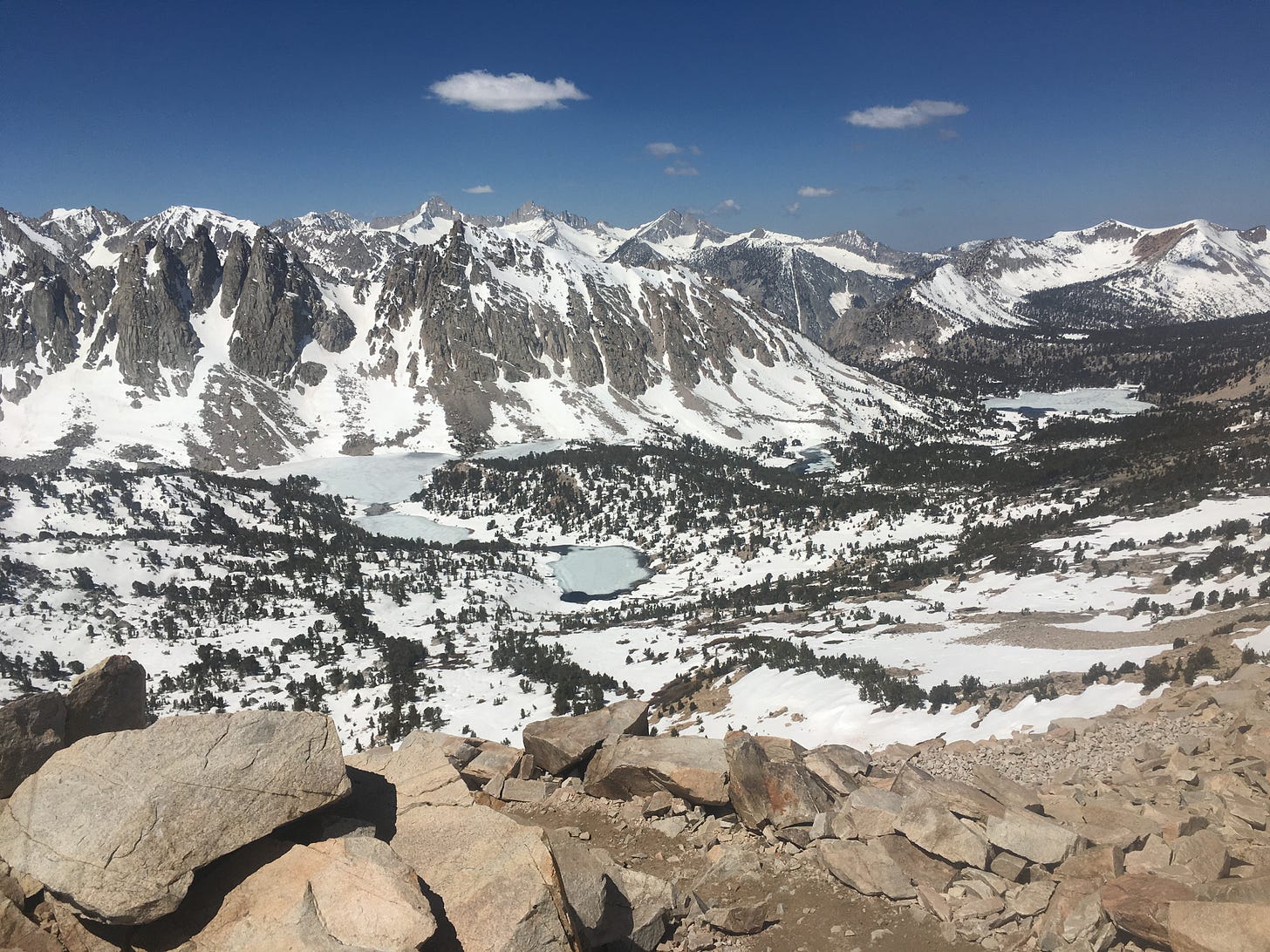
But I don’t wish to sully the occasion by dragging out the negatives. I find hopelessness and misanthropy boring in equal measure. Instead I like to think about the other people out there, the good ones, the ones who’ve flown all over the country to see each other since, the ones I’m in a book club with, the other hikers who do like getting political and I can talk about unions and strikes and injustice with.
I like to think about the taste of water in alpine creeks and beneath lava springs. The tartness of huckleberries found by the trailside. The way some mornings brought the sight of elk grazing gently on hillsides and others brought spiderwebs so strong I could hear them break as I walked through them. It’s maybe a cheap trick to lean so heavily on stuff I’ve written before but here’s what I was thinking a few days before the end.
It’s September, and the weather has taken a turn. It rains every day now, a steady, gray heaviness that makes the miles seem that much more interminable and the end of the trail seem bizarrely abstract. My joints and bones feel ground to so much dust. I am breaking down, slowly but surely.
Still, part of me wants to stay in these woods forever. They have taught me so much about the world, things I’d never have learned otherwise. How to tell if a huckleberry is ripe. The best way to cross a raging creek fat with snowmelt. The taste of river water made gray by glacial till. The interconnectedness of things.
But it’s precisely this interconnectedness that makes me realize I can’t stay here forever. There is too much to be done and too many people to be helped. The bell is tolling for me. If I stay here I’ll never have a family, never teach a freckled daughter how to make a shelter out of sticks and a bed out of pine boughs. If I stay here I’ll never help knock down a prison wall, never add my voice to the chorus clamoring for justice in this most unjust of places. If I stay here I’ll never get married to the woman of my dreams, who’s been waiting for me at home these long months with more patience than I can possibly deserve.
I think that maybe this is the best of us, the best we have. These wild places. When I think about loving America I cannot think of our institutions or the values we claim to share and uphold. There’s too much pain there and too many broken promises. But our mountaintops are a meritocracy. Our berry brambles will feed anyone without condition, restriction, or public shame. There is no politicking among bears, marmots, jays.
I am still out here. I will be gone from these woods eventually, at last and too soon, and I will leave them in the hope of returning after doing something to make my small corner of the world a little better than I left it. That’s not required, but it’s often asked, and I think it’s worth aspiring to.
But for now there is still a little time to be present in this place. Time to read a book in the scant shade of a fir tree, time to listen to the whistling of marmots and the cries of pikas as I briefly intrude on their comings and goings. Time to retreat within myself as the rain comes down unabated and see what I’m made of beneath the surface. I am, after all, only a guest in this world, but that doesn’t mean I can’t help tidy up the house.
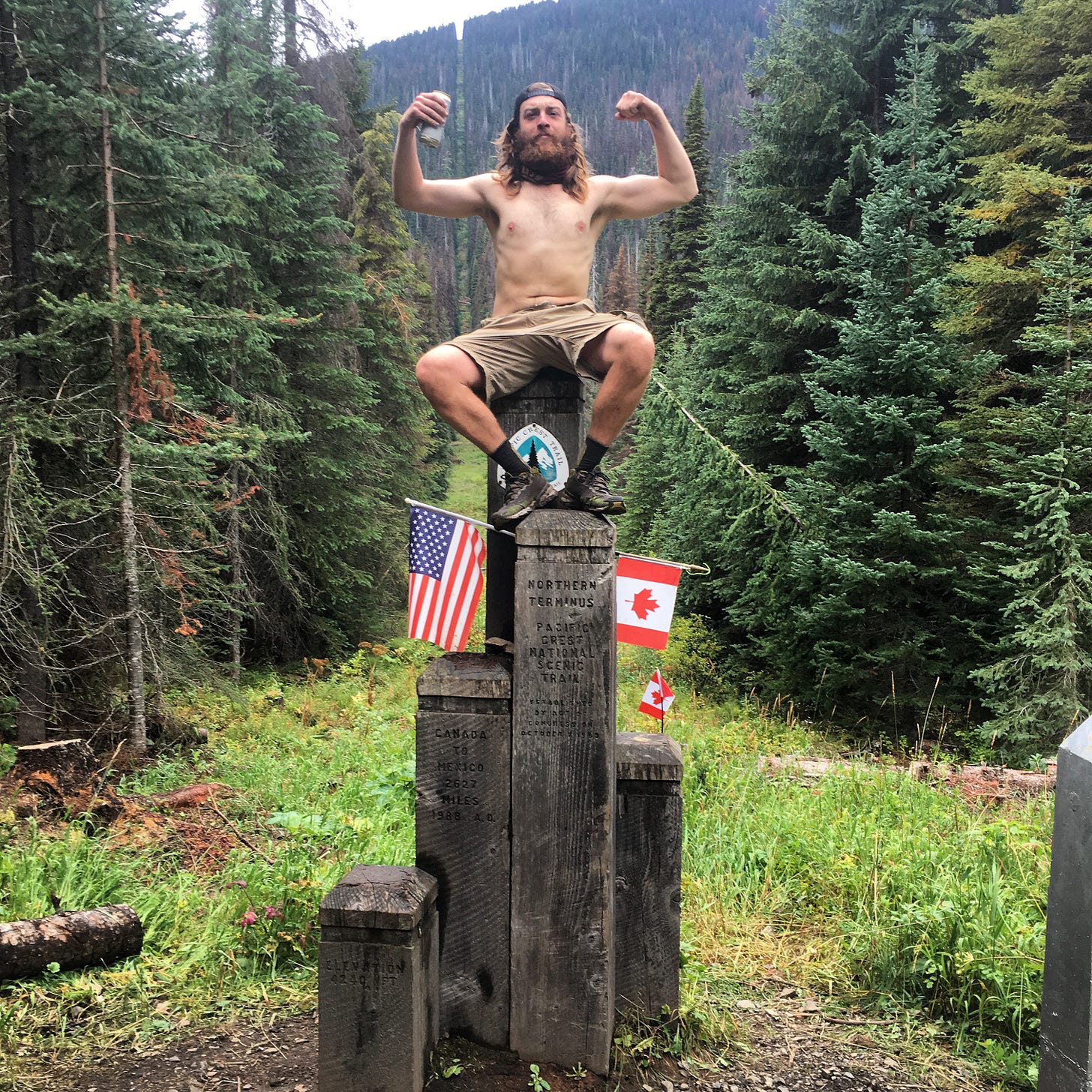
One last thing before I go. I can’t write about the trail without showing proof of the physical transformation I went through. I used to worry it might seem like bragging, but I am now confident that it is not. Here is me the day before I began and the day after I finished. Neither one is the healthy me; the 165 pounds left on my frame by the end of things was frankly a little frightening. (Plus 25 should be old enough to be a little bit more committed to keeping the bathroom mirror clean.)
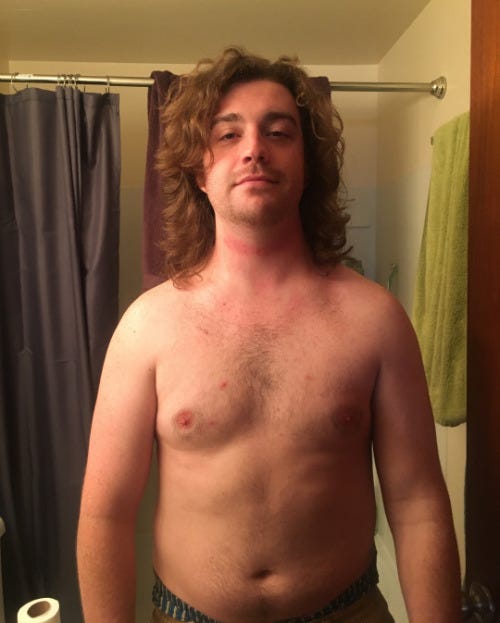

My feet are still not fully healed from the experience of walking myself into shape and then beating myself into iron. My ankles and Achilles still give me trouble after all I put them through. And my brain has been changed, too, for good and for ill. It is not a glamorous thing to thru-hike, most days, but I’m glad I did it and I appreciate you taking the retrospective ride with me.
Love,
Chuck

